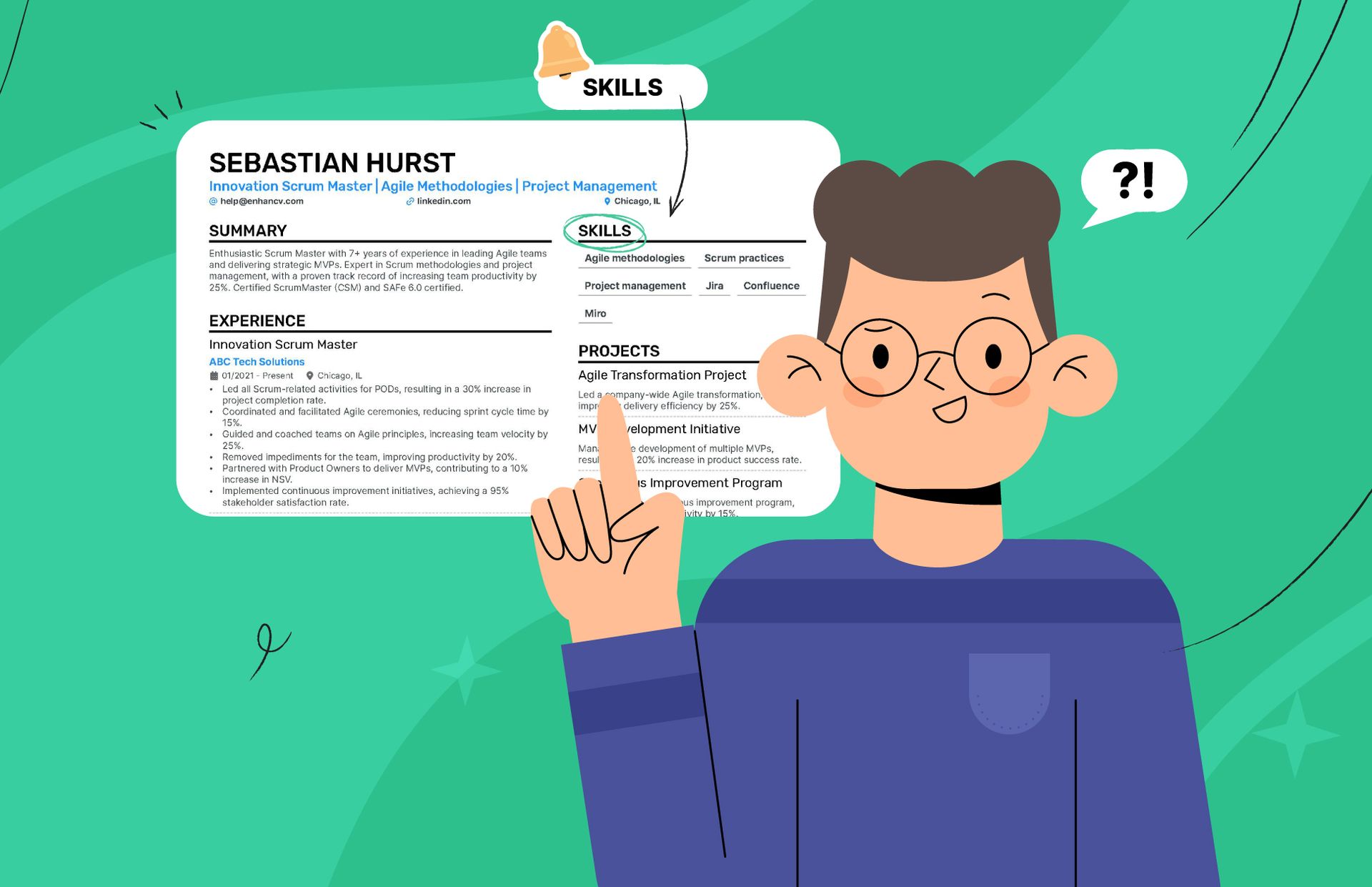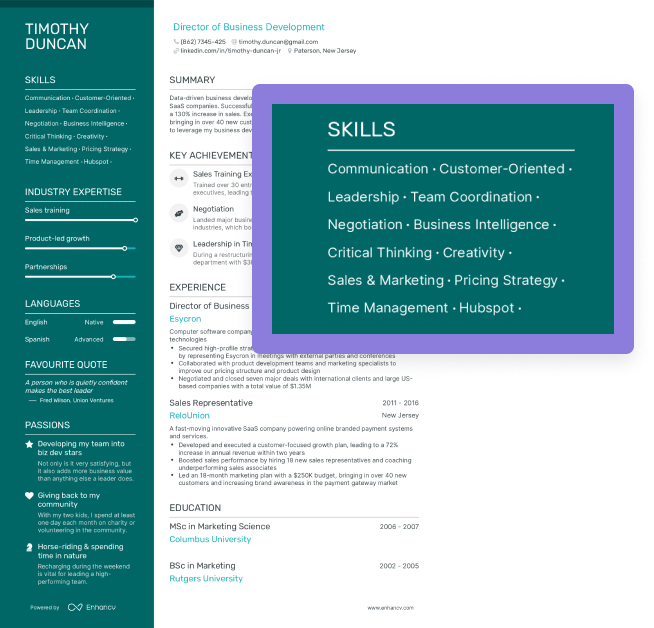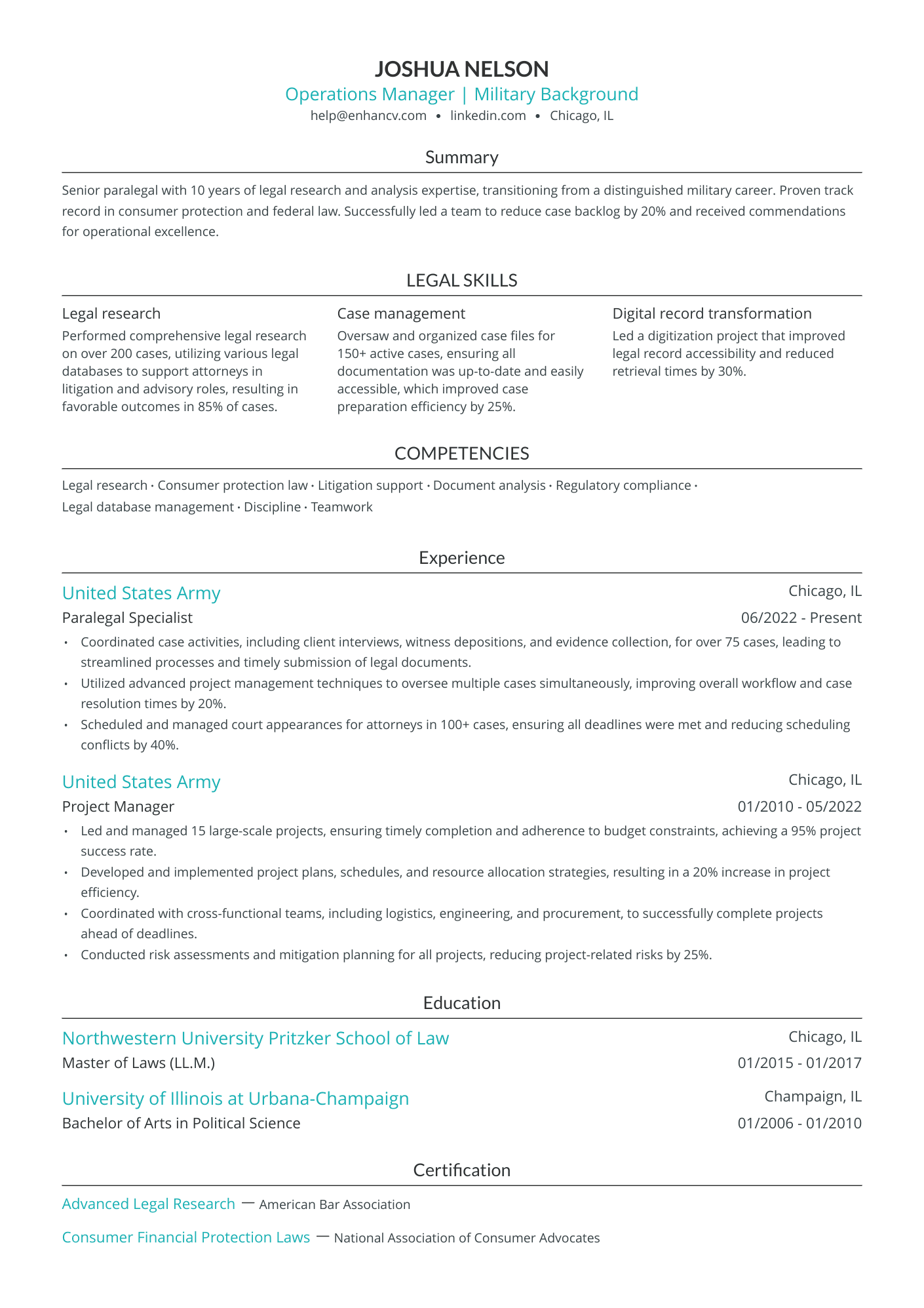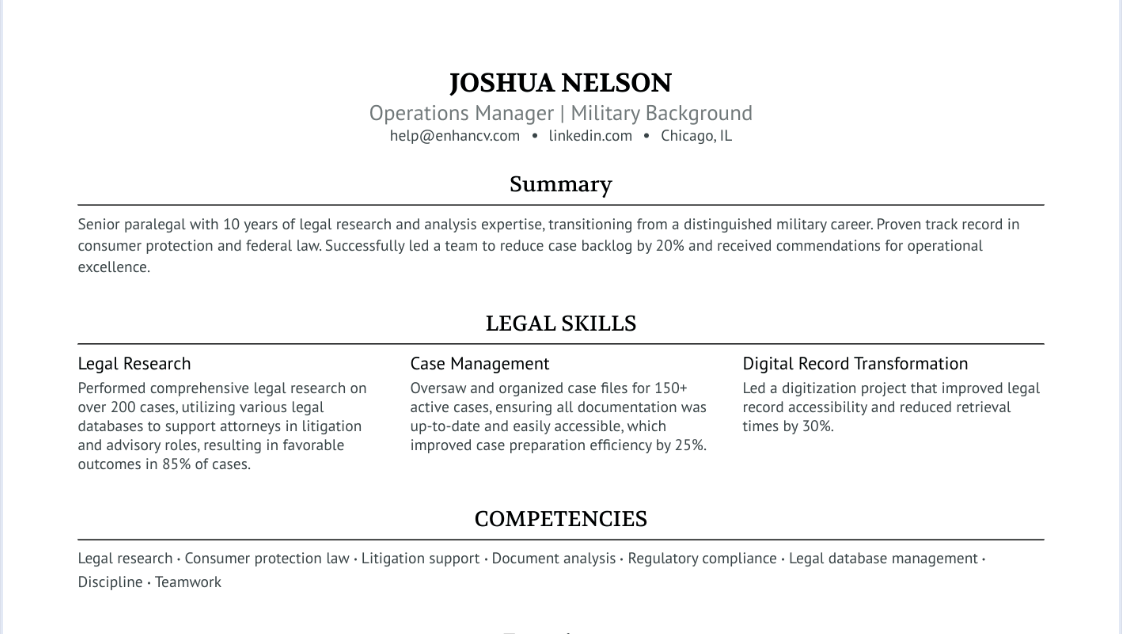Your resume’s skills section is like a spotlight, shining on what you do best—but only if you aim it right.
Sure, your work experience matters, but the skills section can be the key to standing out when employers only spend seconds on each resume.
Do you really need it? Sometimes, yes! But not always.
In this post, we’ll guide you on when to include a skills section, how to tailor it for your ideal role, and the best way to showcase your abilities without overwhelming the hiring manager.
We have a full guide for the 200+ resume skills that are in demand, and how you need to list and identify them accurately for the job you’re applying for.
Key takeaways
- Include a dedicated skills section, especially for technical or creative roles, to show your expertise upfront.
- Tailor this resume component to match the job description for better results with both recruiters and ATS systems.
- Highlight your most relevant abilities, using specific examples to back them up.
- Organize your skills in a way that’s easy to read, like using bullet points or a two-column layout.
- Be honest about your proficiency levels to avoid any surprises during interviews.
What is the skills section of a resume?
This part of your resume sections is where you list and describe your most relevant abilities, often showing how you've applied them in real-world scenarios. It’s typically placed near the top and helps both applicant tracking systems and recruiters quickly identify your qualifications.
Your skills section is more than just a list of buzzwords—it persuades employers you're the right fit for the job. Done well, it aligns your strengths with the job requirements and sparks immediate interest from hiring managers.
When do you need a resume skills section?
Let’s clarify—you always need to include skills on your resume, but they don’t always need their own dedicated section.
That said, a skills section is crucial when you need to underscore specific abilities that align with the job you're applying for.
Skill-based hiring is the future
According to a study by Test Partnership, there's a growing shift toward skill-based hiring instead of traditional resume sifting. An impressive 93% of participants agreed that focusing on skills is more effective in finding the right candidates. Supporting this trend, 48% of recruiters on LinkedIn are already using skills data to help fill their roles, underlining the increasing importance of a well-crafted skills section on your resume.
Here are the exact scenarios when having a skills section is a must.
The job requires specific technical skills
If you’re applying for roles in fields like IT, engineering, or design, where technical know-how is essential, a skills section is crucial. It allows you to underscore your expertise in things like coding, software, or specialized tools upfront.
You’re changing careers
Switching careers? A skills section helps bridge the gap between your past experience and the new role by emphasizing transferable skills. It’s your chance to show how abilities like project management or problem-solving can apply to a completely new field.
You have limited work experience
For recent graduates or those with no work experience, the skills section can take the spotlight. Demonstrating your skills—whether learned in school, internships, or personal projects—can make up for a shorter work history.
You want to improve your ATS score
Many companies use ATS to manage applications and store resumes. A well-tailored skills section with the right keywords from the job description can help your resume get noticed.
You want to show you value recruiters’ time
In fast-paced industries, having a skills section at the top helps grab hiring managers’ attention. It gives them a quick overview of your capabilities before they dive into your work experience.
PRO TIP
A common misconception is that ATS will filter you out of the job application process completely. In reality, ATS doesn't eliminate resumes—it simply scans for keywords from the job listing. The more relevant keywords your resume includes, the better your chances of impressing recruiters. So, while ATS helps organize applications, it’s still up to actual human beings to make the final call.
Types of skills to include in your resume
There are four major types of skills you can feature on a resume. Keep in mind, that not all of them need to be listed in a separate section. It’s important to weave your abilities throughout your resume—from your work experience to your summary—to give a complete picture of what you offer.
Before we dive into how to craft a skills section tailored to your situation, let’s explore the different types of skills you can highlight.
Hard skills
Hard skills are practical, measurable abilities like programming, data analysis, or proficiency with specific software. These skills are typically gained through education, training, or hands-on experience. Employers seek them to ensure you can handle the technical demands of the job.
Technical skills
A major subgroup of hard skills, your tech skills relate to the tools or platforms that you’re proficient in. If the job requires things like SEO, Adobe Photoshop, or CRM software, list them separately to show you’re ready to hit the ground running.
The most popular tech skills found on the resumes of Enhancv users
Soft skills
Soft skills are developed through your interactions with other people and include traits like communication, teamwork, and problem-solving. They’re essential for how you get on with colleagues and navigate workplace challenges. Since these skills are harder to quantify and provide concrete evidence for, it's best not to list them in an isolated section but to demonstrate them through your work experience, projects, or education.
Transferable skills
Transferable skills work across industries, like leadership, time management, or project management. They’re especially helpful when switching careers or roles.
The most commonly listed soft and transferable skills on Enhancv customers’ resumes
- Strategic planning
- Leadership
- Business development
- Product strategy
- Communication
- Time management
- Customer service
- Problem solving
- Stakeholder management
- People management
How to write the key skills on your resume
Writing a skills section that employers actually read involves more than just listing your strengths. It’s about tailoring it to the specific job you’re applying for. This is called resume targeting and is at the core of any good resume.
Here’s how to do it:
Step 1. Study the job description
Carefully read the job description and make a list of the specific skills the employer is seeking. Focus on both hard and soft skills that are mentioned.
Step 2. Match keywords
Use the exact language from the job listing when describing your skills. This helps your resume pass through ATS scans and shows recruiters you’re a match. For example, if the job description asks for "SEO expertise," list that instead of general terms like "marketing knowledge."
Step 3. Customize the skills section for the role
Tailor your resume skills for each specific application. For example, a marketing role might require skills like "content creation" and "social media management," while a project management position could require "budgeting" and "team leadership." Adjust your skills list based on what each role emphasizes.
Step 4. Prioritize relevant skills
List your most relevant skills first, focusing on those that are most important to the job. Group your skills by category if needed, such as "Technical Skills" or "Leadership Skills," to make it easier for recruiters to scan.
Step 5. Keep it concise and specific
Be clear and concise. Avoid generic skills like "good communicator" unless you can back them up with specific examples in your work experience. Instead, focus on skills that directly relate to the job.
PRO TIP
Crafting a targeted skills section is simple with Enhancv’s resume builder, which features an ATS Check tool. It allows you to paste the job description and evaluate how well your skills align with the specific requirements of the job posting.
Skills on a resume—an example that works
Let’s put this into practice and show you how to create your skills section using a real-world job description.
Below is an example of a software engineer job posting:
Software Engineer
About the Role & Team
Media Engineering is an innovative organization focused on providing the best possible video playback experience, art, and metadata to customers worldwide.
The Tooling Ecosystem Team is responsible for developing software solutions that enhance UI/UX frameworks, authentication, and web infrastructure that support the operator tools within Media Engineering. Our mission is to seamlessly integrate user experience with top-notch security measures.
Responsibilities:
- Craft and maintain the UX/UI framework that enhances developer productivity for operator tools.
- Assists in managing the authentication integrations to the wider company login service.
- Basic understanding of the business needs and works with business partners to clarify questions that emerge during execution.
- Contributes to the team's core fundamental software project needs by applying team best practices and standard software guidelines.
- Collaborates with other engineers to deliver new features and bug requirements.
- Supports a culture of collaboration and innovation.
- Builds quality products.
Required qualifications & skills:
- Experience in frontend UI development and proficiency with one or more general-purpose programming languages (JavaScript and/or HTML/CSS).
- Desire to work in a start-up, fast-growth, or rapid-change environment.
- Problem-solving skills to identify the root cause.
- Solid communication skills—written, and oral.
- Understanding of agile methodologies and git source control.
- Experience in programming with backend development (Java/Python).
Preferred qualifications:
- Experience with React, Angular, and NodeJS.
- Experience building APIs.
- Experience with AWS technologies and cloud infrastructure.
- Experience using technologies/services such as Terraform, Jenkins, and Docker.
Education:
- Bachelor’s degree in Computer Science, Information Systems, Software, Electrical or Electronics Engineering, or comparable field of study, and/or equivalent work experience.
In technical resumes, it’s important to have a clearly displayed "Toolbox" section for your hard skills, while soft skills can be naturally woven into other resume parts.
If the candidate here meets most of the tool requirements listed in the job description, they can easily transfer them onto their resume.
Here’s how that might look:
This is the simplest way to present skills on your resume, but it's not the only option. In the next segment of the guide, we'll explore other effective methods for listing and describing skills to help you set yourself apart.
Alternative ways to list skills
What if you have multiple types of skills to showcase? How do you ensure all your qualifications are covered while keeping your resume organized? Below, we share a few solutions that are both ATS and recruiter-friendly.
Using a skills-based resume template
A skills-based resume is ideal for those looking to downplay limited work experience and highlight their strengths. With the functional template, the skills section comes before employment history, allowing you to focus on key competencies by providing brief descriptions for each skill. This approach puts your abilities front and center, giving recruiters a clear view of your value.
Look at an example:
This format is ideal for candidates whose abilities are their main selling point, such as those in creative fields, or individuals transitioning from another industry with a wealth of transferable skills.
Including skills in other resume sections
This method works best for soft skills, which are harder to capture in a simple list. The best places to feature them are in your experience or summary sections.
For example, if you want to emphasize your leadership skills, simply listing "leadership" isn’t enough. You need to provide context to support your claims.
Skills in the experience section
Here’s an example from a marketing director’s resume where the candidate’s ability to lead teams is illustrated in the first bullet point:
- •Led a cross-functional team in the design and execution of inbound marketing strategies, achieving a 40% increase in qualified leads.
- •Managed budgeting and cost optimization for marketing projects, resulting in a 20% decrease in expenses over two years
- •Developed strategic partnerships with media outlets and digital content creators to enhance brand presence.
Skills in the resume summary
A similar effect can be achieved in the profile section, be it a summary or an objective statement.
Take a look at how this math teacher highlights their adaptability and creativity directly in the resume summary:
Skills in the core competencies section
Your headline or core competencies section is another great place to demonstrate your biggest strengths and areas of expertise. Positioned at the top of your resume, these resume parts naturally draw the most attention.
Here’s an example:
Skills in a technical skills section
If you want to showcase your industry knowledge, you can organize and grade your proficiency levels in different areas.
With Enhancv’s resume builder, this section looks like this:
Skills in the achievements section
Recruiters can quickly identify your qualifications when you feature them in the "Key Achievements" section.
Here’s how a project manager effectively handles this:
These achievements underline strong project management skills and technical problem-solving expertise, especially in process improvement and scalable solution implementation. The icons (which are optional) visually reinforce these claims, adding an extra layer of clarity.
How to format skills on a resume
When you’re creating your resume skills section, you need to decide not only what skills to include, but how you’re going to structure and format it.
Here’s what you should do for maximum impact:
- Keep it concise by focusing on the most relevant skills for the job you’re applying to, without overloading it with everything you know.
- Use bullet points, columns, or lines to keep your resume clean and easy to scan.
- A simple two-column layout works especially well if you want to balance both your skills and work experience.
- Group similar skills together, like “Technical Skills” and “Soft Skills,” to keep things organized.
- Make sure to prioritize your most important or in-demand skills, listing them first so they stand out.
- Pay attention to wording—using both full terms and abbreviations can enrich your resume semantically. For example, you can include both "SEO" and “search engine optimization,” but ensure you do have it written the way it’s mentioned in the job posting.
- Stick to traditional section titles like “Skills,” “Strengths,” or “Tools” to ensure compatibility with ATS systems. Avoid overly creative headings like “What I’m Good At,” as they might not be recognized by the software.
Is your resume good enough?
Drop your resume here or choose a file. PDF & DOCX only. Max 2MB file size.
How to back up your skills on a resume
Without evidence, listing skills on your resume doesn’t hold much weight.
Here’s how you can back them up:
- Use measurable achievements and tie your skills to specific accomplishments, like "Increased sales by 25% through targeted digital marketing campaigns" instead of just saying "Digital marketing.”
- Use your cover letter to expand on key skills listed in your resume. This is a chance to provide more detailed examples and show how your abilities align with the job.
- Be ready with real-life examples. In an interview, employers may ask how you’ve used your skills in past jobs. For instance, if you list "time management," be prepared to talk about when you successfully handled multiple projects or met tight deadlines.
- Be honest about your skill level. Exaggerating your proficiency in something like "expert in Python" can backfire if you can’t demonstrate it during the interview.
- Anticipate follow-up or curveball questions, as you’ll often be asked about specific challenges you faced and how you overcame them. Prepare your answers in advance to show that you’re not just using buzzwords, but can actually back up your skills with real examples.
The best 16 skills to put on a resume
No matter where you’re applying or what kind of job you’re targeting, some skills just work universally.
Skills sections in numbers
According to the latest resume statistics, job descriptions typically include over 20 required skills, yet only 22% of resumes meet that expectation. Most applicants fall short, listing an average of just 15 skills.
Let’s delve into the skill groups that can complete your profile and add value to your resume.
Communication skills
Every workplace depends on clear and effective communication, making this skill essential for collaboration, problem-solving, and client relationships.
Here’s what’s associated with good communication regardless of the field:
- Active listening
- Public speaking
- Presentation skills
- Written communication
- Negotiation
- Conflict resolution
- Interpersonal skills
Problem-solving skills
Employers value individuals who can think critically and find solutions to complex challenges. In your resume, include any of the following abilities related to problem-solving:
- Analytical thinking
- Creative thinking
- Risk assessment
- Decision-making
- Troubleshooting
- Critical thinking
Adaptability
In today’s fast-changing work environments, being flexible helps you thrive amid change and uncertainty.
- Open-mindedness
- Emotional resilience
- Time management during change
- Quick learning of new tools or methods
- Multitasking
- Dealing with ambiguity
Teamwork and collaboration
Teamwork is essential in most modern workplaces. Rarely will you find a role where success depends solely on individual effort.
Here’s what collaboration includes:
- Building trust and rapport
- Cross-departmental collaboration
- Leadership within teams
- Mediation of team conflicts
- Accountability
Leadership skills
Leadership is not just for managers—anyone can showcase initiative and motivate others toward common goals.
- Mentorship
- Strategic planning
- Delegation
- Inspiring and motivating others
- Performance management
- People management
- Stakeholder management
Time management and organization
The ability to manage time and tasks efficiently ensures productivity and reliability in any role.
- Prioritization of tasks
- Calendar management
- Meeting deadlines
- Attention to detail
- Goal setting
Technical proficiency
Here are the essential tech skills that belong on any resume—basic tools everyone should know, plus some AI skills that are becoming increasingly valuable in today’s workplaces.
- Proficiency with office software (Microsoft Office, Google Workspace)
- Data analysis tools (Excel, SQL)
- Project management tools (Trello, Asana)
- IT troubleshooting
- Digital communication platforms (Slack, Zoom, Microsoft Teams)
- Data entry and organization
- Generative AI tools for productivity (ChatGPT, MidJourney, or similar platforms)
Emotional intelligence (EQ)
A high EQ fosters better relationships and personal growth in professional settings.
- Empathy
- Self-awareness
- Handling criticism constructively
- Influencing and persuading others
- Conflict de-escalation
Creativity and innovation
Creative thinking brings fresh ideas and solutions to any industry or job role.
Here’s what it encompasses:
- Brainstorming
- Designing and prototyping
- Thinking outside the box
- Marketing and branding strategies
- Storytelling
Customer service skills
Delivering great customer experiences is a cornerstone of success—not just in hospitality but in any role. Whether you're working with clients or collaborating with colleagues, these customer service skills can set you apart:
- Empathy and understanding of customer needs
- Problem resolution
- Active listening during interactions
- Building rapport with clients
- Managing difficult or irate customers
Project management skills
The ability to plan, execute, and oversee projects ensures business goals are achieved efficiently.
- Budgeting and resource allocation
- Task delegation
- Risk management
- Tracking milestones
- Agile methodology familiarity
Data literacy
In a data-driven world, the ability to understand and utilize data is a valuable asset across industries.
- Data collection and organization
- Statistical analysis
- Data visualization (charts, dashboards)
- Understanding KPIs and metrics
- Reporting insights
Negotiation skills
Negotiation is useful for securing agreements, managing expectations, and resolving conflicts.
- Persuasion techniques
- Finding win-win solutions
- Understanding opposing perspectives
- Compromise and consensus building
- Setting boundaries
Cultural competency
Diversity and globalization require professionals to work respectfully and effectively across cultures.
- Understanding cultural differences
- Adapting communication styles
- Managing multicultural teams
- Global awareness
- Inclusivity in decision-making
Research skills
Knowing how to find, analyze, and apply information is critical for solving problems and making decisions.
- Internet research and fact-checking
- Literature reviews
- Competitor analysis
- Market research
- Synthesizing information
Initiative
Motivated employees who can take charge of their own development are highly valued.
- Goal setting and follow-through
- Taking ownership of tasks
- Seeking opportunities for learning
- Identifying areas for improvement
- Staying productive without supervision
Resume skills for the top ten industries in the US
Let’s dive into the ten most popular industries in the US right now and explore the in-demand skills that make you stand out in each field.
Healthcare skills
Nursing and healthcare are among the fastest-growing industries in the US, requiring both technical expertise and compassion. Interestingly, in 2023, 64% of companies in the medical and healthcare services sector worldwide identified creative thinking as their top priority for reskilling, while 24% emphasized design and user experience as key focus areas.
Here are the skills employers are looking for:
- Patient care and bedside manner
- Electronic health records (EHR) management
- Medical coding and billing
- Diagnostics and clinical skills
- Infection control procedures
- Communication with diverse patient groups
- Team collaboration in multidisciplinary settings
- CPR and first aid certification
- Time management in high-pressure environments
- Adaptability to new healthcare technologies
Information technology skills
The tech field continues to boom, making IT and software development skills highly sought after.
According to a Pearson report, by 2029, tech professionals will need to achieve proficiency in 23 future-proof capabilities and expertise in at least four, including personal learning and digital collaboration. This highlights the growing importance of continuous skill development in the industry.
Below are some examples to pay attention to:
- Programming languages (Python, Java, C++)
- Cloud computing ( AWS, Azure)
- Cybersecurity practices
- Data analysis and visualization (Power BI, Tableau)
- Generative AI tools and development
- Mobile app development
- Agile and Scrum methodologies
- Troubleshooting and technical support
- Networking and IT infrastructure
- UX/UI design
- Automation
Finance and accounting skills
From managing budgets to navigating taxes, the finance industry thrives on precision and attention to detail. These skills are in high demand:
- Financial analysis and forecasting
- Budgeting and cost control
- Accounting software (QuickBooks, SAP)
- Risk assessment and management
- Tax preparation and compliance
- Cash flow management
- Investment portfolio analysis
- Regulatory compliance knowledge
- Audit preparation and execution
- Strong numeracy and data interpretation
Education skills
Education professionals shape the future, and these qualifications are essential to thrive in the field:
- Classroom management
- Curriculum design and lesson planning
- Differentiated instruction techniques
- Student engagement and motivation strategies
- Conflict resolution and student counseling
- Technology integration (EdTech tools)
- Assessment and grading
- Public speaking and presentation
- Parent-teacher communication
- Professional development and lifelong learning
- Remote learning
- Psychology
- Speech therapy
- Special education
Sales and marketing skills
Sales and marketing professionals drive business growth. Here’s what helps their resumes stand out from the crowd:
- Lead generation and prospecting
- CRM software (Salesforce, HubSpot)
- SEO and content marketing
- Social media strategy and advertising
- Negotiation and closing deals
- Data-driven decision-making
- Market research and analysis
- Branding and storytelling
- Event planning and execution
- Public relations and crisis management
- Sales
Construction skills
From electricians to carpenters, skilled trades are the backbone of infrastructure.
These are the key skills:
- Blueprint reading and interpretation
- Hand and power tool operation
- Safety compliance and OSHA knowledge
- Project management for construction sites
- Welding and metal fabrication
- Electrical systems installation and repair
- Plumbing and HVAC systems
- Time estimation and budgeting
- Masonry and concrete work
- Troubleshooting and problem-solving
Retail and e-commerce skills
Retail and e-commerce are evolving industries, requiring a mix of customer service and digital skills.
Here’s what matters most:
- Inventory management
- POS system proficiency
- Customer service and conflict resolution
- Sales techniques and upselling
- Digital marketing for e-commerce
- Supply chain management
- Product merchandising and display
- Data analysis for sales trends
- Social media management
- Vendor relations
Hospitality and tourism skills
Whether it’s in hotels or travel agencies, hospitality professionals need these noteworthy skills:
- Guest relations and satisfaction
- Multilingual communication
- Event planning and coordination
- Inventory and resource management
- Travel booking systems (e.g., Amadeus, Sabre)
- Food and beverage management
- Crisis management in customer service
- Upselling and cross-selling services
- Health and safety compliance
- Cultural sensitivity
Manufacturing and production skills
In an era of automation, manufacturing still requires hands-on skills and technical knowledge:
- CNC machine operation
- Quality assurance and control
- Supply chain management
- Lean manufacturing principles
- Equipment maintenance and repair
- Process optimization
- Troubleshooting machinery issues
- Assembly line management
- Forklift operation
- Inventory control
Entertainment and media skills
Creativity and technology come together in entertainment and media. Here are the most in-demand skills:
- Video production and editing (e.g., Premiere Pro, Final Cut)
- Graphic design and animation
- Content writing and storytelling
- Social media strategy and growth
- Photography and photo editing
- Audio engineering and sound design
- Public speaking and on-camera presence
- Event planning and promotion
- Licensing and copyright management
- Branding and influencer collaborations
Frequently asked questions about skills on a resume
Here’s what you should keep in mind when crafting your resume skills section.
What skills do employers expect to see on a resume?
Employers typically look for a balanced mix of job-specific skills and soft skills—a combination that’s essential no matter the role. While each job may have its unique requirements, this mix remains the foundation of what recruiters value.
- Job-specific skills include the technical expertise, certifications, or industry knowledge you need to perform the role effectively. For example, a software developer might need proficiency in Python, while a nurse might need experience with electronic health records.
- Soft skills, on the other hand, are transferable and crucial across all fields. These include qualities that help you collaborate, solve problems, and excel in any workplace.
What skills should I mention in my resume?
To figure out exactly what to add, check the job description closely. It’s like a cheat sheet, spelling out the specific skills and qualities the employer is looking for. Tailoring your resume to reflect this mix can make a big difference.
How do I write my skill levels on a resume?
It’s important to clearly communicate your proficiency. Use terms like beginner, intermediate, proficient, or expert to describe your level. With the Enhancv resume builder, you can easily grade your skill level visually, making it simple for recruiters to see where you excel and where you’re still growing.
Additionally, it’s always a good idea to include measurable details to underscore your expertise, like “Proficient in Excel, including pivot tables and VLOOKUP.” And remember, honesty is key—overstating your skills can backfire during interviews or on the job.
What are the best skills for candidates with no work experience?
If you don’t have formal work experience, highlight transferable skills from school, volunteer work, or personal projects. Think about teamwork from group assignments, communication from presentations, or organization from managing a busy schedule. Employers value skills like reliability, eagerness to learn, and problem-solving, even if you’ve gained them outside a traditional job.
What mistakes should I avoid when listing skills on a resume?
Your skills section is one of the most important parts of your resume, so it’s crucial to avoid these common pitfalls:
- Listing irrelevant skills (e.g., your high school typing class for a marketing role) that don’t align with the job requirements.
- Overloading your resume with too many skills. Remember, quality over quantity! Focus on the skills that add the most value to the role.
- Using vague phrases like “team player” or “good communicator” without backing them up with context or examples.
- Exaggerating your abilities—it’s tempting to oversell, but you risk being caught out during interviews or on the job.
To make your skills section shine, keep it focused, relevant to the job, and aligned with the rest of your resume.
Conclusion
To wrap things up, your resume’s skills section can really set you apart, especially if you tailor it to the job and keep it well-organized. By tailoring your skills, focusing on relevancy, and presenting them in a clean format, you can create a resume that resonates with both ATS systems and human eyes.
Make one that's truly you.







